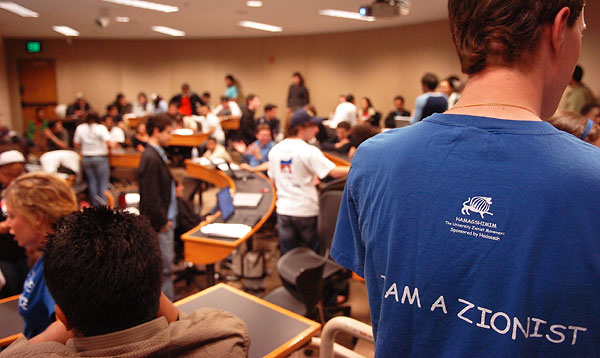
 Innovative Minds © 2014. All Rights Reserved. www.inminds.co.uk | ||||
Student urges Stanford divestment from IsraelValerie Richardson, The Washington Times
We don't want our university to profit from abuses of human rights and violations of international law
Omar Shakir, Student Omar Shakir wants Stanford University to divest from a country that he says engages in an apartheid-style system of oppression and human rights abuses against a beleaguered minority. Bosnia? Sudan? Not quite. Mr. Shakir is referring to Israel and its treatment of the Palestinians, and his campaign has become this year's hot political topic on the Stanford campus. "We don't want our university to profit from abuses of human rights and violations of international law," said Mr. Shakir, a senior international-relations major who heads Students Confronting Apartheid in Israel. His critics, who are legion, say there's no comparison between South African apartheid, which codified a separate legal system for blacks and whites, and Israel, which has placed some restrictions on Palestinians in self-defense after years of suicide bombings. Mr. Shakir disagrees. "The comparison has been made by prominent people like [South African] Bishop Desmond Tutu between Israel's treatment of the occupied territories and South African apartheid," he said. "It's not this fringe idea." Indeed, Stanford isn't the first to wrestle with the divest-from-Israel concept. Since 2002, similar campaigns have been started at Harvard, Duke and Yale universities, and at least one city, Somerville, Mass., has considered the idea, according to Divestment Watch, which tracks the movement.
The student senate is considering a bill that would urge the university to divest its holdings from companies including Lockheed Martin, Boeing, Caterpillar and even McDonald's, which prohibits its employees from speaking Arabic
So far one major U.S. organization, the Presbyterian Church (U.S.A.) has agreed to divest from Israel. In the United Kingdom, the Academic Union of Teachers, an educators union, has also divested. At Stanford, the student senate is considering a bill that would urge the university to divest its holdings not from Israel, but from companies whose products support the military or the building of the "security barrier" separating the occupied territories from Palestinian settlements in the West Bank. Those companies would include Lockheed Martin, Boeing, Caterpillar and even McDonald's, which prohibits its employees from speaking Arabic, Mr. Shakir said. The student senate is expected to consider the measure after next week's spring break. Some senators have suggested holding a campuswide town hall meeting next month to discuss the Israeli-Palestinian conflict. Mishan Araujo, a junior public-policy major who serves as president of the Stanford-Israel Alliance, opposes the idea, saying it would validate the divest-from-Israel arguments. "I wouldn't support a discussion about whether Israel has a right to exist, and I won't support a discussion about whether Israel is an apartheid state," Miss Araujo said. She noted that a petition circulated in support of Israel gathered more than 1,300 signatures, including 91 faculty members. A petition backing divestment from Israel gained about 520 signatures, including a half-dozen faculty. Mr. Shakir conceded that the divestment movement isn't likely to succeed this year, but he's optimistic about its future. He noted that student leaders are planning to expand beyond the student body by promoting the proposal among administrators, board members and even alumni. "A lot of people are quick to write this off. We know it's not going to happen this year, and it's not going to happen next year," he said. "But we feel like we're building consensus. This is the direction the debate is going."
Senate plans vote on MidEast divestmentMegan Maass, The Stanford Daily The ASSU Undergraduate Senate moved a step closer to voting on the controversial Israel divestment bill that members first discussed during winter quarter at its meeting last night. Senator Nabill Idrisi â09, who authored the proposal, told his peers that he made several changes to the first version of the bill to reflect their concerns and those of other students. Barring a motion to table it, the Senate will vote on the issue at next weekâs meeting. âThe main change is that itâs not immediately calling for divestment, but instead suggests following an established protocol of reevaluating investments in areas that cause âsubstantial social injuries,ââ Idrisi said, referring to Stanfordâs Statement on Investment Responsibility, which dictates that the Board of Trustees should consider divestment from companies whose âactivities or policies cause substantial social injury.â âThe blame [for human rights abuses] is not placed on Israel as a state,â Idrisi added. âRather, [the bill] is suggesting that itâs only these particular Israeli government policies that are causing human rights violations.â Idrisi also cites Amnesty Internationalâs statement that Palestinian human rights are violated by âclosures, curfews and demolitions of homes as a form of collective punishmentâ in his proposal. The bill asks the Board of Trustees to âreevaluate investments in companies that violate international law and abuse human rights in Israel and Palestineâ in five ways, which range from companies deemed to be âenabling militant organizations to carry out attacks on civiliansâ to those âengaging in practices that institutionally discriminate against people of a specific race, religion or ethnicity.â The revisions also recommend divesting from companies that support the âbuilding or maintenance [of the] separation barrier currently being built in the West Bankâ; companies that âfacilitate home demolition, land confiscation or other acts of collective punishmentâ; and companies that âprovide military support and weaponry to facilitate operations [in] illegally occupiedâ territories. Idrisiâs changes also attempted to address concerns that the first version of the bill was explicitly biased because it did not acknowledge Palestinian responsibility for the conflict in the Middle East. To this end, Idrisi added a Human Rights Watch statement which read, âthe Hamas-led Palestinian authority needs to take immediate steps to end attacks on civilians by Hamasâs own militant wing and other armed groups.â While it encourages divestment from Israel, the bill makes a point of addressing the concerns of Jewish students on campus, stating that, âdivestment from abuses in a particular country isnât meant to alienate or offend students with strong religious or ethnic ties to that country.â The Senate also approved changes to the judicial charter that will broaden the jurisdiction of the Board on Judicial Affairs in sexual assault cases and extend the time window for victims to report an offense.
ASSU rejects divestment - Despite five 'yes' votes againt three 'no' votesMegan Maass, The Stanford Daily The Undergraduate Senate failed to pass a controversial but toothless divestment bill last night calling for the University to reevaluate its investments in Israel and Palestine. Despite garnering five âyesâ votes and only three ânoâ votes, the measure failed to gather the majority it needed to pass after five senators abstained.  Dozens of undergraduates crowded the ASSU Senate meeting last night to express their opinions on a bill that would call for the University to divest from Israel and Palestine The Senate first discussed the bill â authored by Nabill Idrisi â09 â at a February meeting, but delayed voting until yesterday due to a makeover the bill underwent after a variety of concerns were raised. At the February meeting, the Senate heard from Omar Shakir â07, president of Students Confronting Apartheid in Israel (SCAI), and Andrew Ehrich â09, president of the Jewish Student Association (JSA). Shakir and Ehrich briefly addressed the chamber over the billâs changes at last nightâs meeting. The debate was not as lengthy or as heated as it was at the February meeting, possibly due to prevailing concerns about last weekâs ASSU elections results. (Please see âElection Questionedâ, page 1.) âThe major issue this bill comes down to,â Shakir said, âis that the Board of Trustees reevaluate its investment responsibilities.â âWhat weâve got here is a bill that reflects compromises,â he added, referring to the changes made to the bill, which included a focus on investment responsibility instead of an explicit call for divestment. The revised bill also included a Human Rights Watch statement which reads, âThe Hamas-led Palestinian authority needs to take immediate steps to end attacks on civilians by Hamasâs own militant wing and other armed groups.â Ehrich contested Shakirâs claims. âThis bill, though changed, remains one-sided, unfair and a detriment to peace in the Middle East,â he said. Ehrich called the billâs inclusion of the Human Rights Watch statement condemning Hamas âdisingenuous.â âHamas is a recognized terrorist organization, so no one invests in them anyway,â Ehrich said. âWhich is more proactive â to invest in peace, or to divest from people who may be trying to solve the situation?â Though the bill failed to win enough support to pass in the Senate, Shakir told The Daily after the meeting that he thought the eveningâs results constituted a âvery positive step.â âI see this as a real victory,â he said, âto have more âyesâ than ânoâ votes just a few months after this campaign was launched.â Ehrich said that student opinion about divestment is divided, citing a wide range of views about the Middle East on campus. âThereâs really no precedent for such a bill to be brought to the Senate when the [Office of Student Activities] is actively working to promote a fair dialogue with both SCAI supporters and supporters of Israel,â Ehrich said. â[Such a dialogue] would lead to a debate that can be productive and work towards true peace.â Source: http://washingtontimes.com/national/20070324-115203-3471r.htm Also Of InterestPage URL: http://www.inminds.co.uk/article.php?id=10038
|
|
Support Us
If you agree with our work then please support us.Campaigns INMINDS Facebook Live Feed Latest Video's
INMINDS Twitter Feed Tweets by @InmindsComFeatured Video's
You need Flash player 8+ and JavaScript enabled to view this video.
[all videos (over 200)..] Featured MP3 Podcast  "1763 in the Ohio river valley you got Lord Jeffrey Amherst committing to written order an instruction to his subordinate Henry Bouquet, having been defeated by Pontiac Ottawa confederacy in the field. The order essentially says that they have been defeated militarily and is therefore necessary for Amherst forces to request a peace, to sue for peace from Pontiacs people. He instructs Bouquet to convene a parlay with the Indian leadership for that purpose. And as is the custom, as is common courtesy among native populations as was known to the Brits at that time, it would be necessary for those who requested the council to give gifts to those requested to attend. Make those gifts, Amherst says, items taken from a smallpox infirmary in order, I'm going to quote directly now, this isn't a paraphrase: 'in order that we may extirpate this execrable race'. Now key is on this last word, had he said that we might eradicate the opposing combatants, their military capacity, their warriors.. what ever term he wanted to use, it would have been biological warefare. But he didn't say anything about that, he said the 'race'. His intent was to use biological means, to use disease, quite explicitly so, to eradicate an entire population group. And Bouquet was also kind enough to commit to writing in his response the next day, I have done as instructed, dispersing three blankets, two handkerchiefs and sundry other items, hopefully, he says, they will have the desired result. They did.. the lowest estimate of the number of people who died of smallpox as a result of that little gesture of friendship and goodwill is a 100,000!" American Indian scholar, activist in the struggle for liberation of Indigenous Peoples in America On the publication of the book 'A Little Matter of Genocide: Holocaust and Denial in the Americas, 1492 to the Present', 1997 [29min / 10Mb] [all podcasts..] Newsletter Feedback |
 |
 |
















































